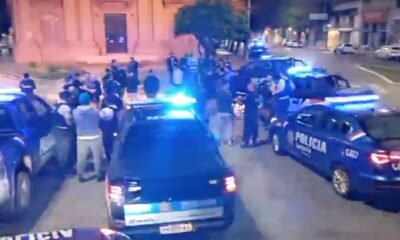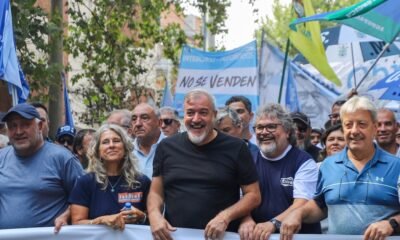INTERNACIONAL
Pope Francis dead at 88, Vatican says

Pope Francis, Bishop of Rome and Supreme Pontiff of the Catholic Church, who worked to instill progressive influences on the global church while maintaining unity with conservatives amid years of turmoil, died Monday morning, Vatican camerlengo Cardinal Kevin Farrell announced.
He was 88 years old.
«Dearest brothers and sisters, with deep sorrow I must announce the death of our Holy Father Francis. At 7:35 this morning, the Bishop of Rome, Francis, returned to the house of the Father. His entire life was dedicated to the service of the Lord and His Church,» Farrell announced.
«He taught us to live the values of the Gospel with fidelity, courage and universal love, especially in favor of the poorest and most marginalized. With immense gratitude for his example as a true disciple of the Lord Jesus, we commend the soul of Pope Francis to the infinite merciful love of the One and Triune God.»
U.S. Vice President JD Vance had just met with the pope on Sunday.
«I just learned of the passing of Pope Francis. My heart goes out to the millions of Christians all over the world who loved him. I was happy to see him yesterday, though he was obviously very ill. But I’ll always remember him for the below homily he gave in the very early days of COVID. It was really quite beautiful. May God rest his soul,» Vance said early Monday morning in a post on X.
Pope Francis meets with U.S. Vice President JD Vance and his delegation during an audience at Casa Santa Marta on April 20, 2025, in Vatican City, Vatican. (Vatican Media via Vatican Pool/Getty Images)
The pope preached frequently on the Catholic virtues of mercy, kindness and humility. He did not shy away from controversy, and American presidents, including Donald Trump and Joe Biden, were not immune from his views.
Less than a month into President Donald Trump’s presidency, the pontiff criticized the Republican’s plans for the mass deportations of migrants, stressing that the forceful removal of people simply for their immigration status deprives them of their inherent dignity and «will end badly.»
In a strongly worded letter to U.S. Catholic Bishops, the pope appeared to counter remarks made by Vice President JD Vance — who had recently converted to Catholicism — after he suggested Americans should care for family, communities and the country before caring about others.
«Christian love is not a concentric expansion of interests that little by little extend to other persons and groups,» the pontiff wrote. «Worrying about personal, community or national identity, apart from these considerations.»
POPE FRANCIS EXPOSES CONFIDENTIAL DETAILS ABOUT HIS ELECTION AND RELATIONSHIPS IN LENGTHY INTERVIEW
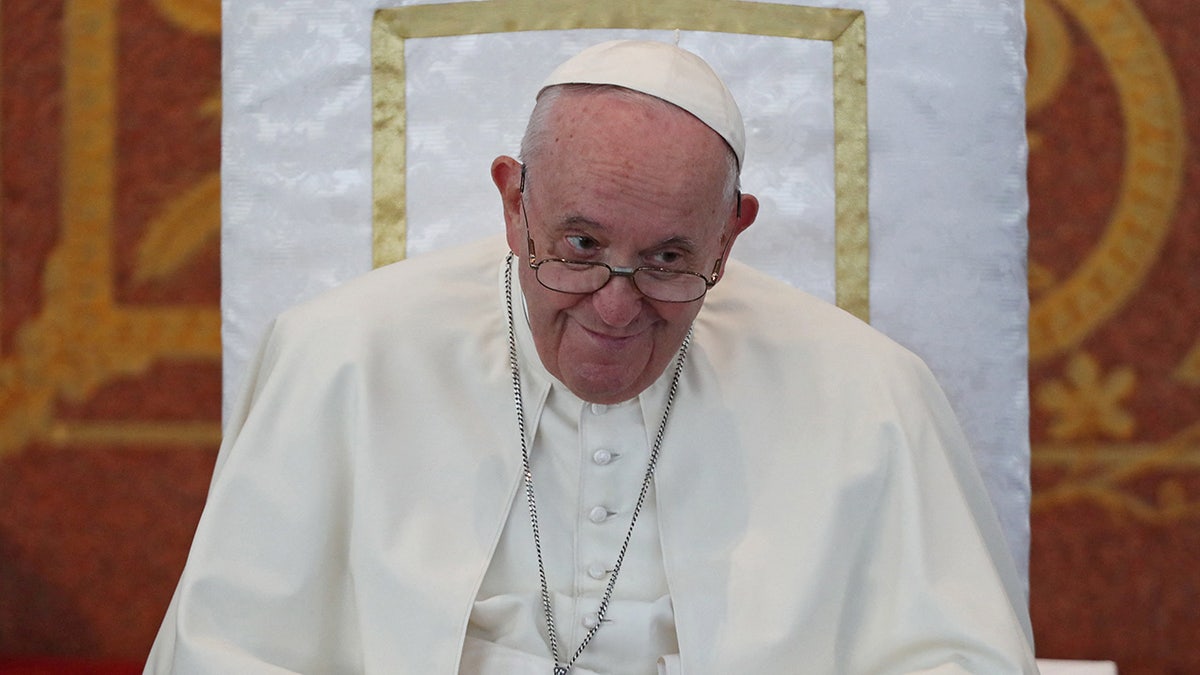
Pope Francis meets with bishops, priests, deacons, consecrated persons, seminarians and pastoral workers in Our Lady of Perpetual Help Cathedral in Nur-Sultan, Kazakhstan, on Sept. 15, 2022. (Reuters/Pavel Mikheyev)
Pope Francis in 2015 became the first pontiff to ever address a Joint Meeting of Congress where he spoke on a range of topics including immigration, family, the death penalty, climate change, extremism, religious freedom and the refugee crisis.
He joined American bishops and urged American leaders to abolish capital punishment and said Congress has a «role to play» in addressing global warming.
In 2022 he questioned then President Biden’s conscience on abortion in an interview during which he described the commander-in-chief’s religious identity and views on abortion as incoherent. «A month after conception, the DNA of the fetus is already there and the organs are aligned. There is human life,» the pontiff said in the interview with Spanish-language outlet Univision.
He also weighed in on candidates Trump and Harris during the election campaign, where he bashed them both, saying, «Both are against life, be it the one who kicks out migrants, or be it the one who kills babies,″ he said, according to the Associated Press.
Just weeks before President Trump’s second inauguration, he appointed Cardinal Robert McElroy to be the Archbishop of Washington. McElroy had been critical of Trump’s immigration policies during his first term as president.
Born Jorge Mario Bergoglio in 1936 to Italian immigrant parents in Argentina, Francis made history as the first pope from the Americas — as well as the first Jesuit to hold the office.
He was elected pope in 2013 after the almost unprecedented retirement of his predecessor, Pope Benedict XVI.
Bergolio’s father, Mario, was an accountant for the railway industry, and his mother, Regina, was a homemaker and caregiver for her five children.
POPE FRANCIS FUELS NEW SPECULATION ON FUTURE OF PONTIFICATE
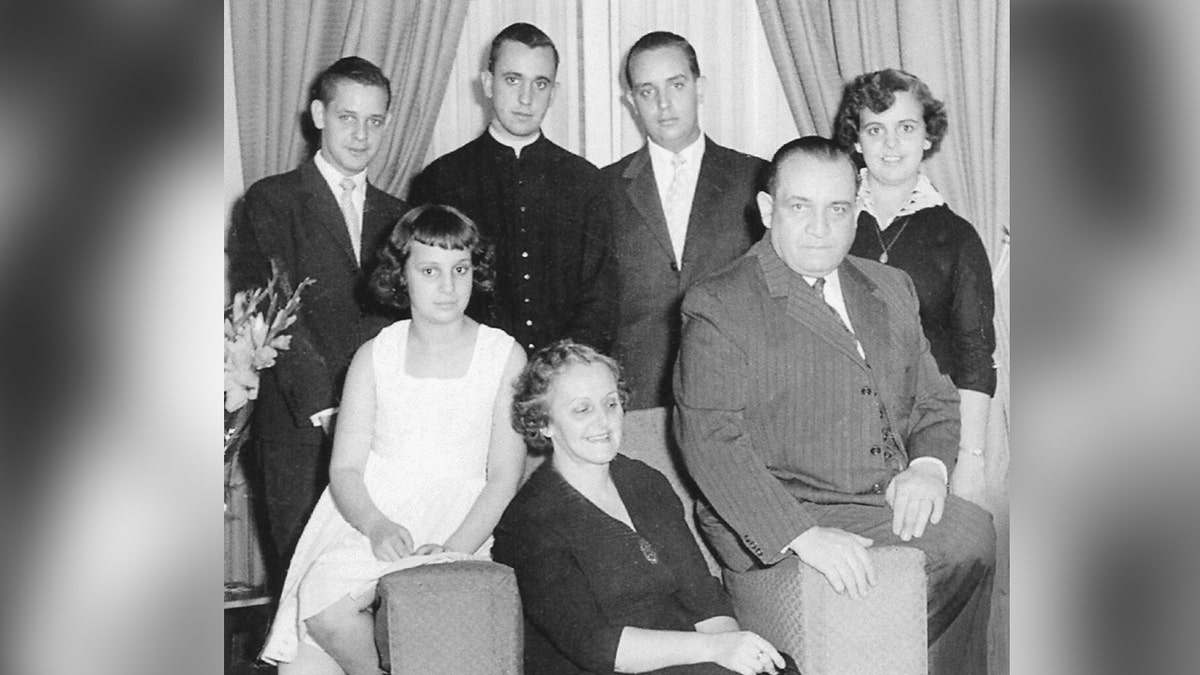
Pope Francis, born as Jorge Mario Bergoglio, is shown here with his family. From left to right, standing, brother Alberto Horacio, Jorge Mario Bergoglio, Oscar Adrian and sister Marta Regina, sitting, sister Maria Elena, mother Regina and father Mario Jose Francisco. (API/Gamma-Rapho via Getty Images)
Throughout his early years, the future pope worked a number of menial jobs. He labored briefly in the stocking factory where his father was an accountant before moving on to other opportunities, including jobs as a bar bouncer and janitor.
He eventually sought a career as a chemical technician, receiving a diploma in chemistry from the secondary school Escuela Técnica Industrial N° 27 Hipólito Yrigoyen. He also worked briefly in a food laboratory. However, his career in chemistry was short-lived.
He entered the priesthood at the Diocesan Seminary of Villa Devoto in Argentina. Francis was ordained a priest in 1969 and made his final profession with the Society of Jesus, also known as the Jesuits, in 1973. The same year, he was appointed as a provincial for the order.
His appointment as provincial was concurrent with the Dirty War, a period of intense state-led persecution of left-wing leaders and political dissidents. Bergolio experienced constant threats to his own safety as he worked to hide or aid in the escape of government targets, including many Catholic faithful.
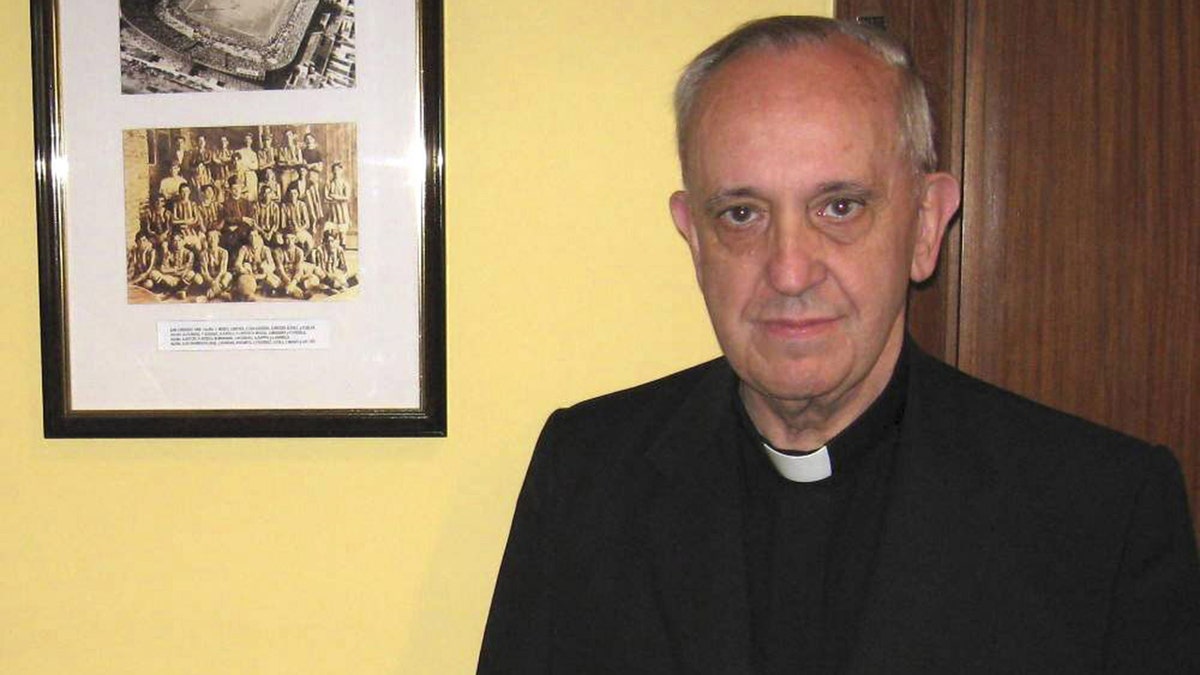
Pope Francis’ is a fan of Argentina’s San Lorenzo Futbol Club. (API/Gamma-Rapho via Getty Images)
During that time, two Jesuit priests under his supervision were disappeared by the government, drugged and left barely alive in a field five months after their kidnapping. Pope Francis has said he was forced to negotiate with the regime for their release.
Bergolio would spend the next two decades bouncing from position to position at the direction of his superiors. He served as a professor of theology, seminary instructor, rector, doctoral student and parish priest.
In 1992, Pope John Paul II appointed Bergolio as titular Bishop of Auca and as an auxiliary bishop of Buenos Aires. This was done at the request of Cardinal Antonio Quarracino, Archbishop of Buenos Aires, who consecrated him to the episcopacy.
Bergoglio proved vital to the nation’s Catholic community, and he was quickly raised to the dignity of Coadjutor Archbishop of Buenos Aires, serving alongside Quarracino and taking over the archdiocese entirely after his death the following year.
Bergoglio was given the crimson hat of a cardinal by Pope John Paul II in 2001.
In 2013, after the resignation of Pope Benedict XVI, Bergoglio was elected to the papacy, selecting the pontifical name «Francis» after St. Francis of Assisi — a choice that set the tone for the rest of his papacy.
POPE DERIDES BIDEN’S ABORTION VIEWS, CATHOLIC SELF-IDENTITY AS ‘INCOHERENCE’
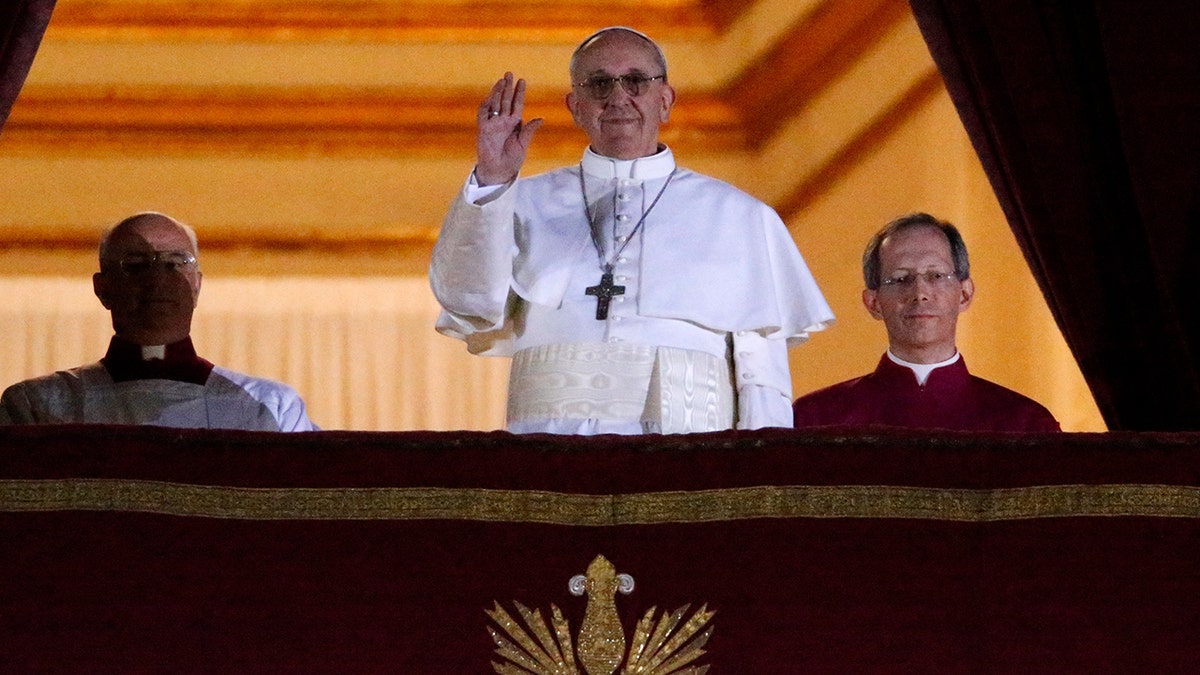
Newly elected Pope Francis, Cardinal Jorge Mario Bergoglio of Argentina appears on the balcony of St. Peter’s Basilica after being elected by the conclave of cardinals, at the Vatican on March 13, 2013. White smoke rose from the Sistine Chapel chimney, and the bells of St. Peter’s Basilica rang out, signaling at the time that the Roman Catholic cardinals had elected a pope to succeed Benedict XVI. (Tony Gentile/Reuters)
Pope Francis’s teachings as a priest, bishop, cardinal and pope were deeply influenced by his Jesuit vocation — viewing each person as a unique creation of God, with whom they can have a personal relationship. His ministry and leadership were committed to keeping doors open and making the church approachable to the public.
It was not only American politics that he had strong opinions of.
He faced criticism for specific remarks he made against Israel’s military operation in Gaza, calling the humanitarian situation in the Palestinian enclave «very serious and shameful.» During that same speech, he condemned the growth of antisemitism throughout the world, Reuters reported. He also called for an end to the war in Ukraine and expressed concerns over climate change.
In 2023, seemingly looking to strike a balance, he formally allowed Catholic priests to give same-sex couples a blessing, which was seen as being a radical shift in church policy, the Associated Press reported at the time.
Pope Francis is also remembered for living a life of intense simplicity, denying himself a lavish papal apartment in the Vatican upon his election, and opting instead for a two-room suite in the Domus Santa Marta, a residence built by Pope John Paul II.
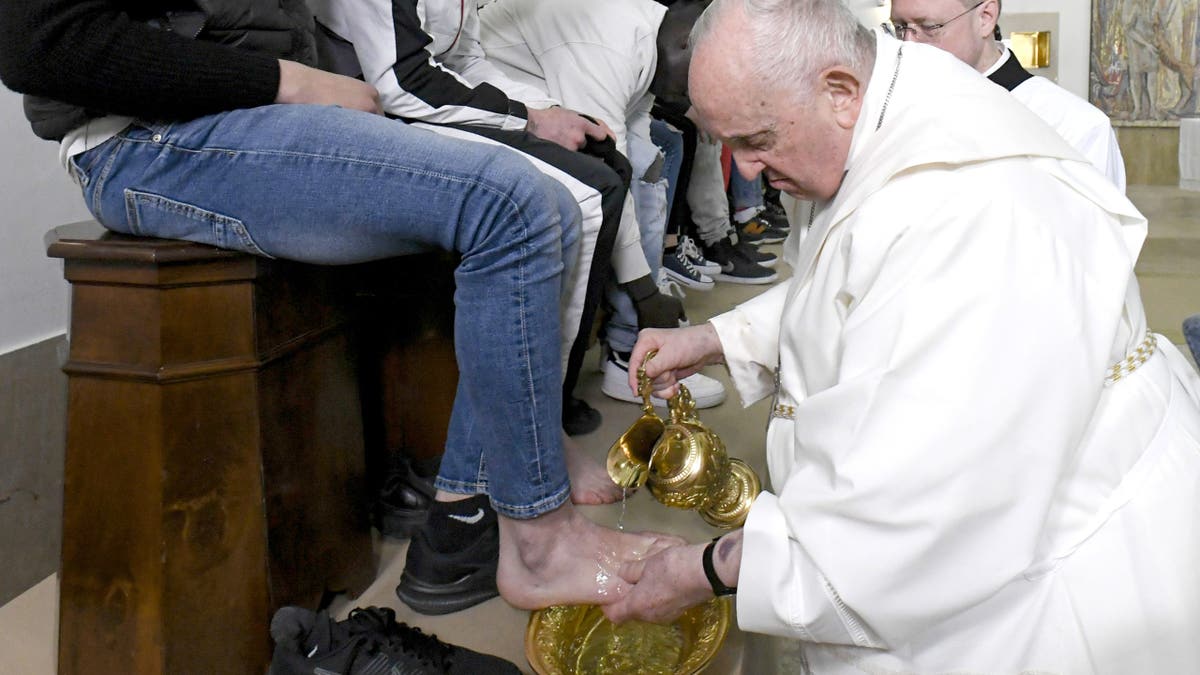
Pope Francis celebrates the traditional rite of the washing of feet at the Casal del Marmo juvenile penitentiary on April 6, 2023, in Rome, Italy. On Holy Thursday, Pope Francis went to the outskirts of Rome to celebrate the Mass of the Lord’s Supper at the Casal del Marmo juvenile penitentiary, where he carried out the traditional rite of the washing of the feet of twelve of the young people there. (Vatican Media via Vatican Pool/Getty Images)
In contrast to his immediate predecessors, Pope Francis eschewed ornate robes or luxurious clothing. His outfit rarely consisted of more than a plain, white cassock tied with a papal fascia.
Pope Francis even dressed down his Ring of the Fisherman — a piece of gold jewelry worn by popes to signify their office — by having it made with silver and only wearing it for ceremonies.
Francis’s tenure continued the ongoing efforts to investigate decades of sexual abuse claims against priests across the world, including in the United States, with Francis vowing transparency in 2019.
«Transparency is now being implemented at the highest level,» said Archbishop Charles Scicluna, the Archbishop of Malta and Adjunct Secretary of the Congregation for the Doctrine of the Faith, after Francis gave legal authorities access to documents about sexual abuse cases and abolished the «pontifical secret» of the cases.
POPE FRANCIS DEFROCKS NOTORIOUS BISHOP WHO CONFESSED TO ABUSING HIS NEPHEW
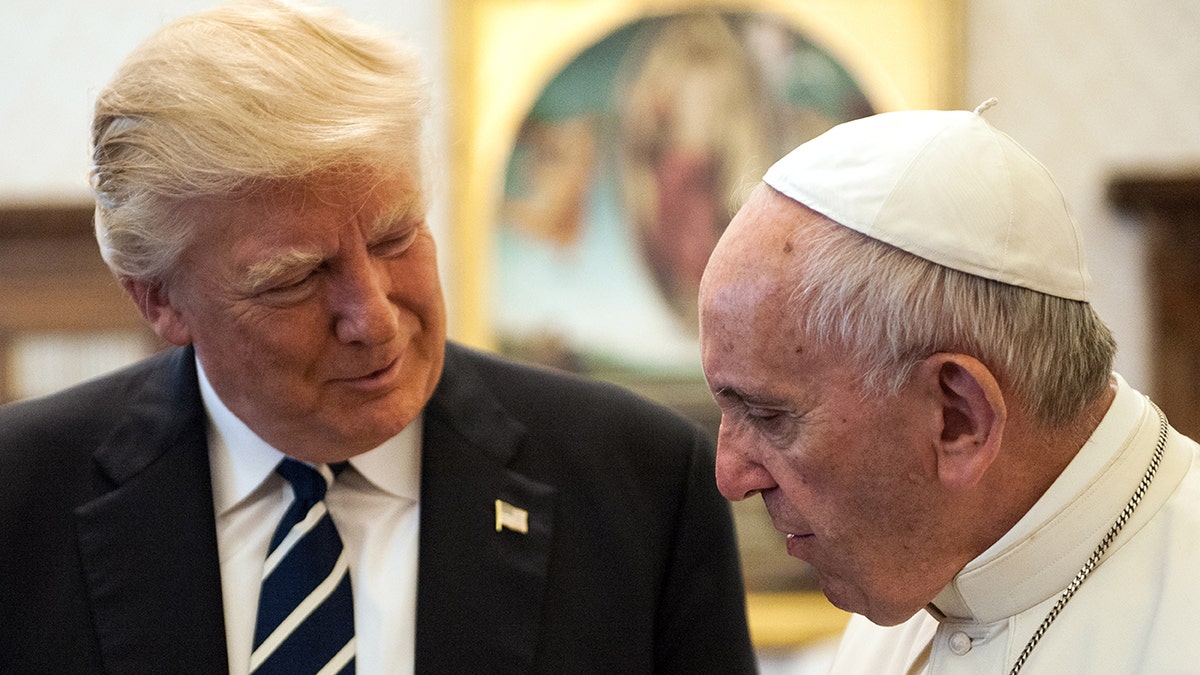
Pope Francis meets President Donald Trump during his first term in the Private Library of the Apostolic Palace with his wife, Melania, his daughter, Ivanka Trump and her husband, Jared Kushner. (Vatican/Pool/Galazka/Archivio Grzegorz Galazka/Mondadori via Getty Images)
He continued Benedict’s work to root malicious clerics out of the Church hierarchy «with the wrath of God,» appointing task forces and establishing victim aid groups.
Pope Francis proved frustrating for a wide variety of conservatives, liberals, traditionalists and progressives.
His gentle — at times vague and confusing — language on key social issues, such as sexuality and divorce, frustrated conservatives hoping for a more aggressive champion of Catholic moral teaching.
In July 2017, a group of Catholic clergy and academics sent Pope Francis a «Filial Correction» document alleging seven serious theological mistakes made by the pontiff in public statements. The document’s assertions proved controversial within the Catholic Church and the document was never explicitly addressed.
Conversely, his refusal to back down from traditional church teachings on abortion, gay marriage, women’s ordination and priestly celibacy frustrated progressives hoping for a more modern church.
Echoing his time as a prelate in Argentina, Pope Francis was at times criticized from both sides of the aisle for his heavy hand enforcing Catholic unity on national and international levels.
Traditionalists voiced intense opposition to his apostolic letter «Traditionis custodes,» which restricted the celebration of the traditional Latin mass in an attempt to squash increasingly separatist conservative movements within the Church.
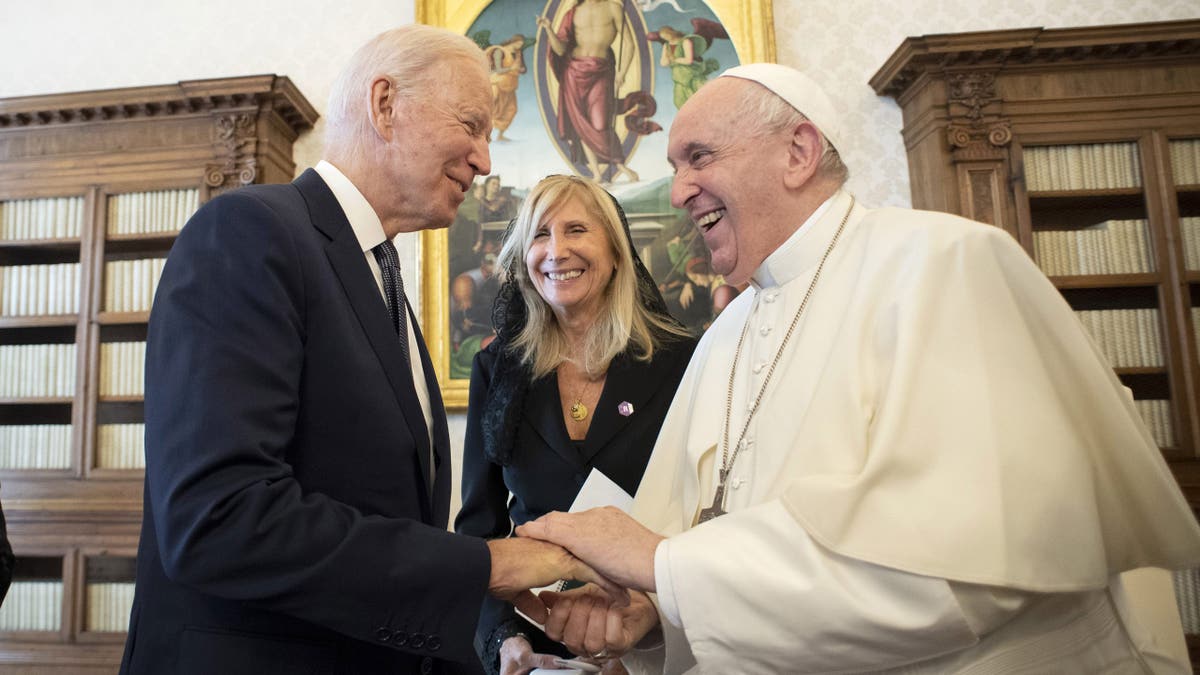
Pope Francis meets with then-President Joe Biden during an audience at the Apostolic Palace on Oct. 29, 2021 in Vatican City. (Vatican Media via Vatican Pool)
He similarly shut down discussion of many social issues that progressives have sought to reform.
In 2019, Pope Francis told a nun asking him to approve the ordination of women that «if the Lord didn’t want a sacramental ministry for women, it can’t go forward,» adding, «We are Catholics, but if anyone wants to found another church they are free [to do so].»
The hyper-progressive leadership of the Catholic Church in Germany was a target of his ire after the country’s clerical leaders attempted an upheaval of traditional teachings regarding gender and sexuality. The Vatican issued a series of letters, approved by Pope Francis, accusing the German church of risking separation from the Catholic Communion.
The conflict with German bishops encapsulated his papacy’s recurring themes of authority and unity, best exemplified in a passage from his «Letter to the Pilgrim People of God in Germany.»
POPE FRANCIS URGES CATHOLIC VOTERS TO ‘CHOOSE THE LESSER EVIL’ BETWEEN TRUMP AND HARRIS
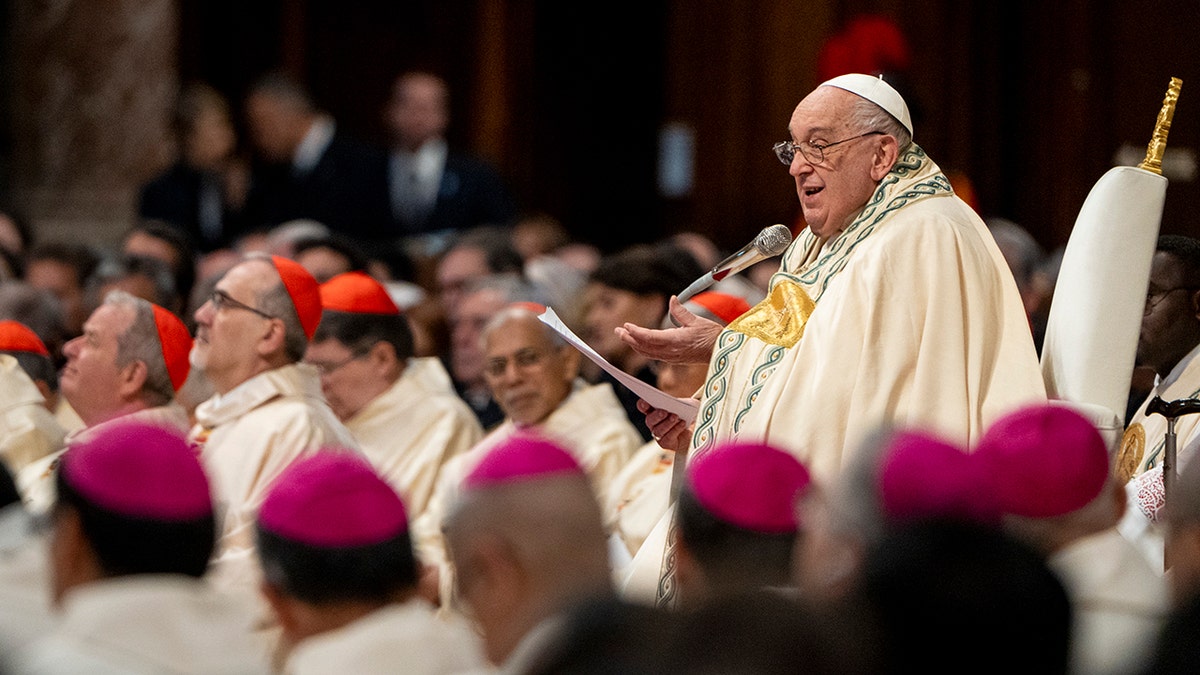
Pope Francis delivers a speech during the Holy Mass with newly appointed Cardinals. (Stefano Costantino/SOPA Images/LightRocket via Getty Images)
In the letter, Pope Francis wrote, «The universal Church lives in and of the particular Churches, just as the particular Churches live and flourish in and from the universal Church. If they find themselves separated from the entire ecclesial body, they weaken, rot and die. Hence, the need always to ensure that communion with the whole body of the Church is alive and effective.»
Pope Francis visited dozens of countries, including the United States and Cuba in 2015, and went as far afield as Papua New Guinea, as well as visits to predominantly Muslim countries including Egypt, Morocco and Jordan.
Pope Francis struggled with health complications throughout his reign.
The pontiff dealt for many years with sciatica, a nerve condition that caused immense pain in his leg and at times hindered his ability to walk.
In 2021, Pope Francis was hospitalized for an intestinal surgery that removed 13 inches of his colon.
In March 2023, Francis was again taken to the hospital after experiencing intense chest pain and difficulty breathing. He was treated for a respiratory infection and released after antibiotic treatment.
CLICK HERE TO GET THE FOX NEWS APP
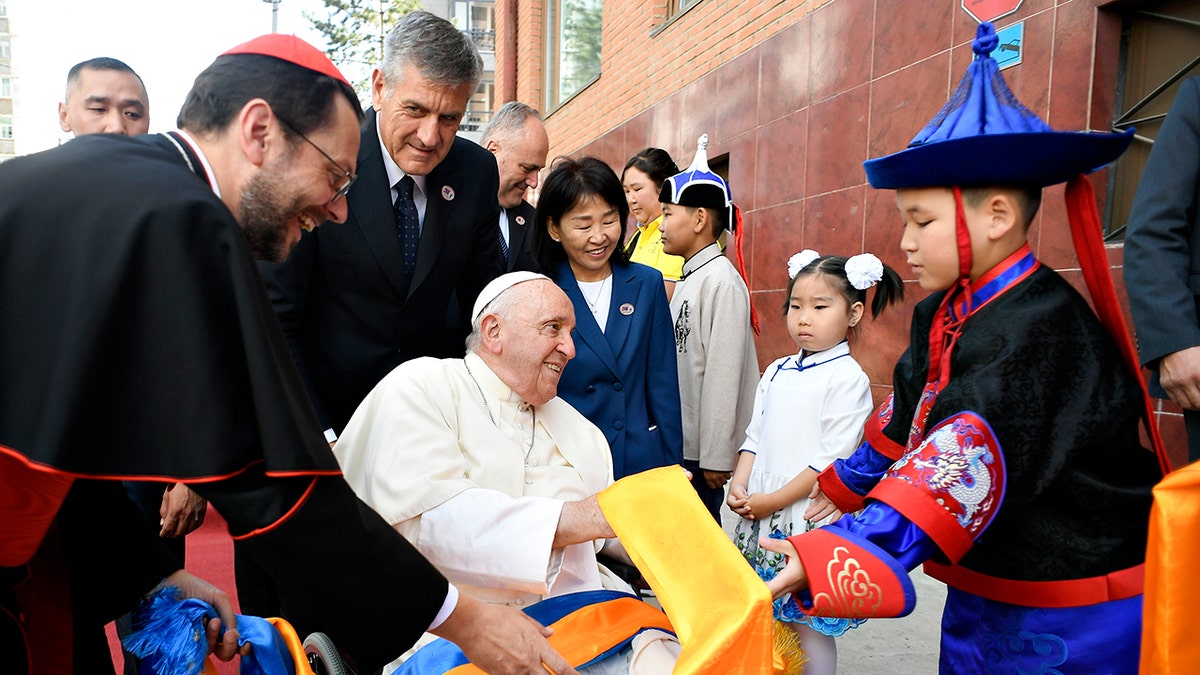
Pope Francis is welcomed as he arrives at the Apostolic Prefecture on Sept. 1, 2023 in Ulaanbaatar, Mongolia. According to the Vatican, the trip was Pope Francis’s 43rd Apostolic Journey abroad and the 61st country he visited as Pope. (Vatican Media via Vatican Pool/Getty Images)
In June of the same year, the pope was brought back for another abdominal surgery to repair an incisional hernia. He was released after making a full recovery.
He took a fall at his residence and suffered a contusion on his right arm in January 2025.
In February, he was once again hospitalized after a bout of bronchitis.
Following Pope Francis’ death, the Vatican has entered a time of sede vacante — in English, «empty seat.»
The Associated Press, Reuters and Fox News’ Annie Butterworth contributed to this report.
INTERNACIONAL
Western Hemisphere defense chiefs convene after border drone scare prompts airspace closure
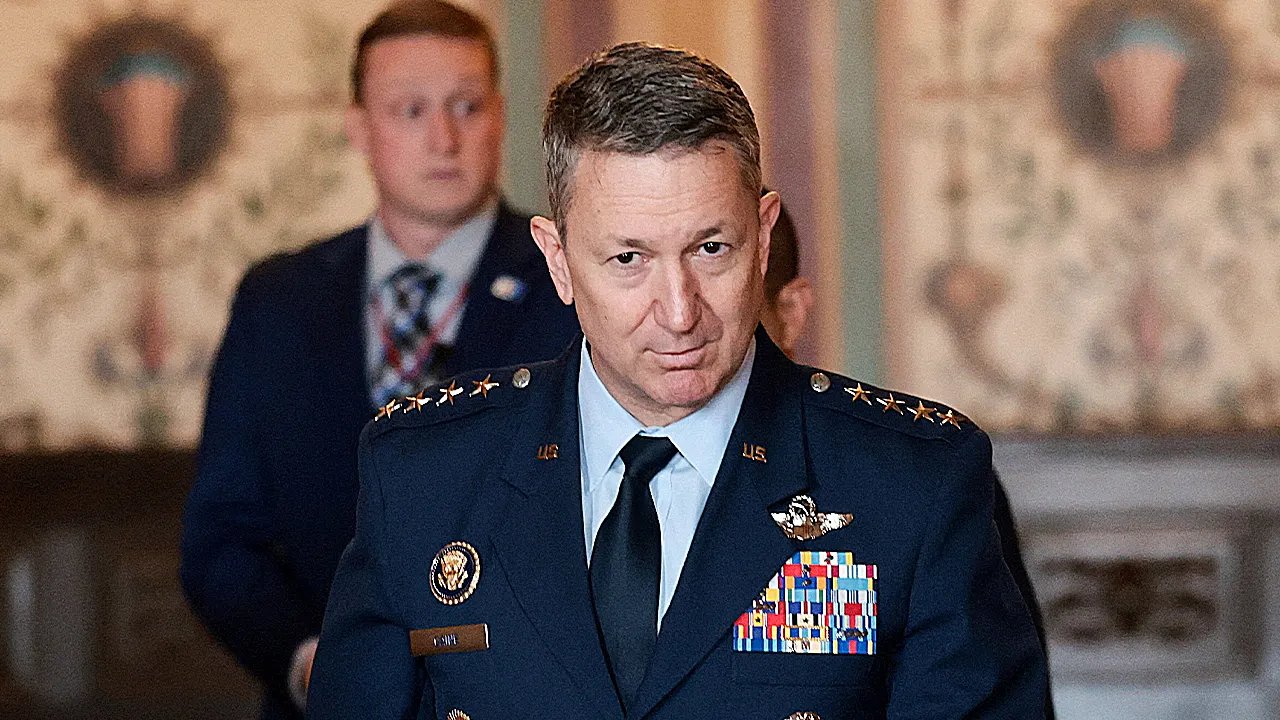
NEWYou can now listen to Fox News articles!
Top U.S. military leaders are hosting more than 30 nations in Washington as the Trump administration moves to deepen security cooperation across the Western Hemisphere, prioritizing border control, drug trafficking and regional threats from global adversaries.
«To put America First, we must put the Americas First,» War Secretary Pete Hegseth said, according to remarks shared by Joseph Humire, U.S. Acting Assistant Secretary of War for Homeland Defense and the Americas.
NORAD AIRCRAFT TO ARRIVE IN GREENLAND FOR ROUTINE EXERCISES
«We must work together to prevent any adversary or criminal actor from exploiting your territory or using your infrastructure to threaten what a great former American president, Teddy Roosevelt, once called ‘permanent peace in this hemisphere.’»
The meeting, convened by Joint Chiefs Chairman Gen. Dan Caine, comes amid a broader national security strategy that places heightened emphasis on threats closer to home: from fentanyl pipelines and transnational criminal networks to Arctic competition and instability in Venezuela.
The conference also coincides with U.S. action against Mexican cartel drones that breached American airspace near El Paso, Texas.
An administration official told Fox News that «Mexican cartel drones breached U.S. airspace. The Department of War took action to disable the drones. The FAA and DOW have determined there is no threat to commercial travel.»
Gen. Dan Caine, chairman of the Joint Chiefs of Staff, is hosting a meeting for the Western Hemisphere defense chiefs in Washington. (Alex Brandon/AP)
The Federal Aviation Administration temporarily restricted flights in and out of El Paso International Airport for what it described as «special security reasons.» Federal officials have not released operational details, but the administration official said the action was directly tied to counter-drone measures along the southern border.
The incident underscores the growing use of unmanned systems by cartel networks and the increasing overlap between traditional criminal activity and homeland defense concerns — a theme expected to surface in discussions among defense leaders gathered in Washington.
Top military leaders from Denmark, Britain and France, nations that have territory in the western hemisphere, have also been invited, according to The New York Times.
FAA WARNS ABOUT FLYING IN CENTRAL, SOUTH AMERICA AND EASTERN PACIFIC, CITING POSSIBLE ‘MILITARY ACTIVITIES’
Gen. Francis Donovan, the new chief of Southern Command, which oversees Latin American and Caribbean operations, is expected to press regional counterparts to intensify cooperation against drug-trafficking organizations and transnational criminal groups that operate across borders and increasingly leverage advanced technology. U.S. officials have warned that cartel networks are using drones, encrypted communications and sophisticated smuggling routes to move narcotics and personnel.

Video shows a kinetic strike on a narco-terror vessel in international waters from Wednesday, Dec. 31. The strikes come amid broader military pressure in the region following high-profile security actions. (U.S. Southern Command via X)
Gen. Gregory M. Guillot, the head of U.S. Northern Command, which leads homeland and north of the U.S. defense including Greenland, is reportedly expected to talk about border controls and integration of advanced sensors across air, land, sea and space domains.
Arctic security also us likely to feature prominently in discussions. The administration has pointed to increased Russian and Chinese activity in the Arctic as a long-term strategic concern and has emphasized the importance of Greenland’s geographic position for missile warning, maritime access and critical mineral resources.

Former Venezuelan President Nicolás Maduro, who was captured by U.S. forces in January in a high-stakes operation and is now facing federal drug-trafficking charges in the United States. The capture has reshaped U.S. security discussions in the Western Hemisphere. (Leonardo Fernandez Viloria/Reuters)
CLICK HERE TO DOWNLOAD THE FOX NEWS APP
The summit comes on the heels of the dramatic U.S. military capture of Venezuelan leader Nicolás Maduro in early January after months of counternarcotics boat strikes.
As the hemisphere’s security landscape continues shifting, defense officials and regional allies alike will be watching to see how other governments with hostile policies toward the U.S. respond to Washington’s increasingly assertive posture.
latin america,pentagon,conflicts defense,drugs,border security,location mexico,joint chiefs of staff,homeland security
INTERNACIONAL
Russia agrees to abide by expired New START nuclear arms limits — as long as US does the same
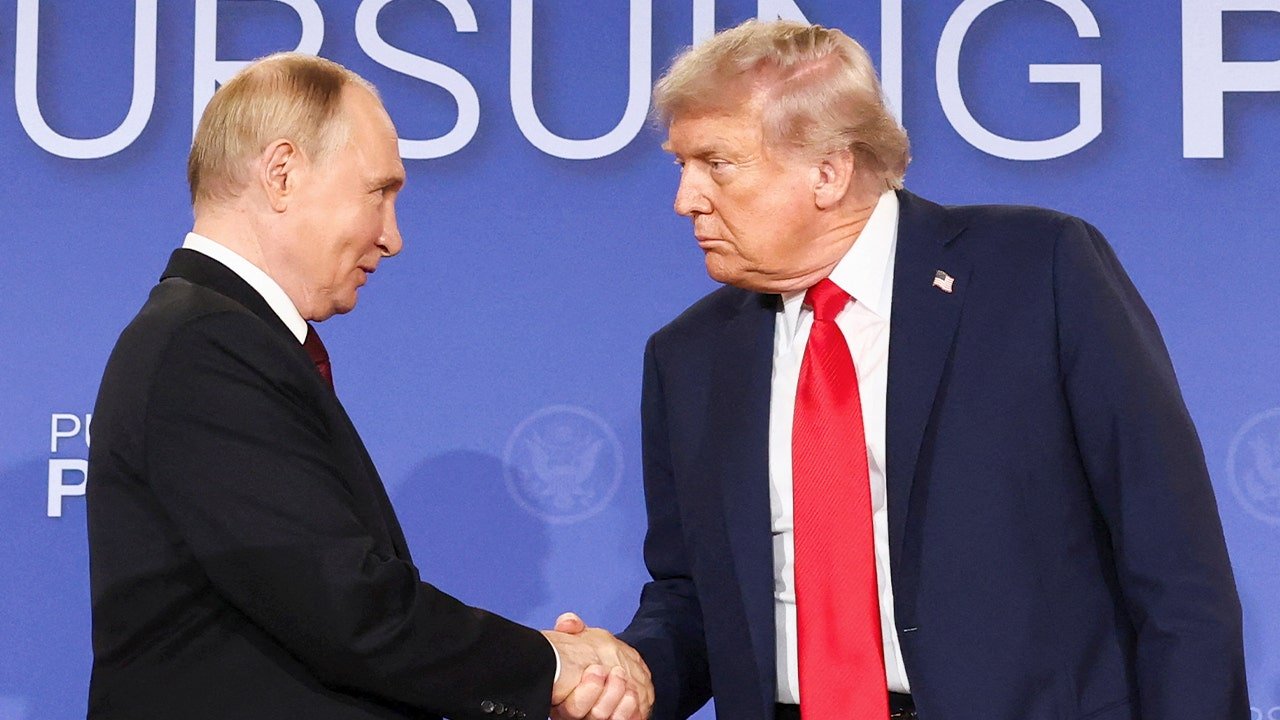
NEWYou can now listen to Fox News articles!
Russia has reportedly agreed to abide by the limits of a nuclear arms pact it reached with the U.S. years ago after the agreement expired last week — as long as Washington does the same.
The New START Treaty’s expiration, which occurred on Feb. 5, leaves the nations with the two largest atomic arsenals with no restrictions for the first time in more than a half-century, The Associated Press reported. The expiration has fueled fears of a possible unconstrained nuclear arms race.
In September, President Vladimir Putin said Russia would abide by the nuclear arms deal for another year after its expiration date as long as the U.S. followed suit, the AP reported. However, President Donald Trump has said he wanted China to be part of a new pact, something that Beijing has rejected, according to the AP.
«Rather than extend ‘NEW START’ (A badly negotiated deal by the United States that, aside from everything else, is being grossly violated), we should have our Nuclear Experts work on a new, improved, and modernized Treaty that can last long into the future,» Trump wrote on Truth Social upon the treaty’s expiration.
WORLD ENTERS UNCHARTED ERA AS US-RUSSIA NUCLEAR TREATY EXPIRES, OPENING DOOR TO FASTEST ARMS RACE IN DECADES
President Donald Trump and Russian President Vladimir Putin meet in Anchorage, Alaska. (Reuters/Kevin Lamarque)
In response to Fox News Digital’s request for comment on the now-expired treaty, the White House pointed to the president’s Truth Social post.
Russian Foreign Minister Sergey Lavrov spoke to lawmakers about the treaty, saying Moscow would «act in a responsible and balanced way on the basis of analysis of the U.S. military policies,» the AP reported.
Lavrov added that «we have reason to believe that the United States is in no hurry to abandon these limits and that they will be observed for the foreseeable future.»

A rocket is launched as part of a ground-based intercontinental ballistic missile test at the Plesetsk facility in Russia on Dec. 9, 2020. (Russian Defense Ministry Press Service via AP, File)
«We will closely monitor how things are actually unfolding,» Lavrov said. «If our American colleagues’ intention to maintain some kind of cooperation on this is confirmed, we will work actively on a new agreement and consider the issues that have remained outside strategic stability agreements.»
TRUMP CALLS FOR NUCLEAR EXPERTS TO WORK ON ‘NEW, IMPROVED, AND MODERNIZED TREATY’
The New START Treaty was signed in 2010 by President Barack Obama and his Russian counterpart, Dmitry Medvedev, and was entered into force on Feb. 5, 2011.
The treaty gave the U.S. and Russia until Feb. 5, 2018, to meet the central limits on strategic offensive arms. The treaty caps each side at 700 deployed ICBMs, SLBMs and nuclear-capable heavy bombers; 1,550 deployed warheads; and 800 deployed and non-deployed launchers and bombers. The parties were then obligated to maintain the limits as long as the treaty remained in force, which it did until last week.

President Donald Trump and Russian President Vladimir Putin shake hands during a press conference following their meeting on Ukraine, in Anchorage, Alaska,, Aug. 15, 2025. (Kevin Lamarque/Reuters)
CLICK HERE TO DOWNLOAD THE FOX NEWS APP
The expiration of the treaty comes just after a meeting involving U.S. and Russian officials in Abu Dhabi. Axios previously reported that the two nations were closing in on a deal to observe the treaty for at least six months after its expiration. The outlet added that during the six-month period there would be negotiations for a new deal.
The State Department did not immediately respond to Fox News Digital’s request for comment.
world,russia,nuclear proliferation,donald trump,vladimir putin
INTERNACIONAL
Energía renovable gana peso en Panamá, Gobierno busca aumentar su participación en la matriz energética

Panamá aspira a que más del 85% de su generación eléctrica provenga de fuentes renovables en los próximos años, una meta que, según las autoridades, debe construirse sin descuidar la seguridad energética ni la estabilidad del sistema.
Así lo afirmó el secretario nacional de Energía, Rodrigo Rodríguez J., durante el Foro de Energía organizado por la Asociación Panameña de Ejcutivos de Empresa (APEDE), al señalar que actualmente el país registra cerca de 65% de su matriz energética basada en fuentes limpias, principalmente hidroeléctricas.
Rodríguez explicó que, aunque el objetivo es elevar progresivamente la participación de las energías renovables, Panamá no puede prescindir completamente de un componente térmico que respalde el sistema en momentos de baja generación solar, ausencia de viento o períodos de sequía que afecten a las hidroeléctricas.
“No todo el parque puede ser renovable”, sostuvo, al subrayar que la confiabilidad del suministro sigue siendo una prioridad para el Estado.
El funcionario detalló que, en términos regionales, Panamá parte de una posición favorable, ya que su matriz histórica ha sido mayoritariamente limpia en comparación con otros países.
Entre el 60% y 65% de la generación anual proviene de fuentes renovables tradicionales, especialmente plantas hidroeléctricas de embalse y de pasada. Sin embargo, reconoció que el desafío está en diversificar esa base con solar, eólica y almacenamiento energético.
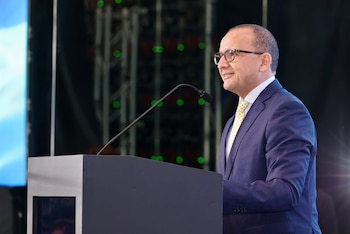
Durante el encuentro, la presidenta de APEDE, Giulia De Sanctis, destacó que el tema energético es fundamental no solo para las empresas, sino también para los hogares y la competitividad del país.
Afirmó que el foro permitió debatir sobre redes, hubs y el potencial de Panamá como un centro energético regional, así como los retos regulatorios y tecnológicos que enfrenta el sector.
De Santis subrayó que uno de los ejes centrales de las discusiones fue el desarrollo de licitaciones públicas con reglas claras, transparencia y criterios técnicos actualizados. “No basta con los avances tecnológicos, también se necesita seguridad jurídica y procesos confiables”, indicó, al referirse a la importancia de atraer inversión privada en proyectos de generación y transmisión.
En ese contexto, Rodríguez confirmó que el Gobierno prepara dos licitaciones clave: una para plantas nuevas, principalmente eólicas e hidroeléctricas, y otra para plantas existentes.
La primera está prevista para inicios de marzo y la segunda para finales del mismo mes. Según el secretario, existe un alto nivel de interés empresarial, tanto de inversionistas locales como extranjeros.
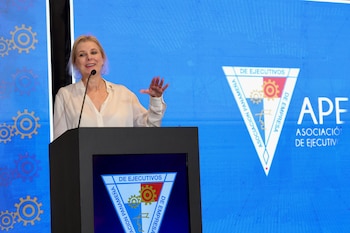
El funcionario señaló que estas licitaciones forman parte de una estrategia para fortalecer la capacidad instalada, reducir la volatilidad tarifaria y mejorar la resiliencia del sistema eléctrico. Añadió que los procesos se han diseñado para garantizar competencia sana, participación abierta y criterios técnicos acordes con las nuevas demandas del mercado.
Otro de los ejes abordados fue el impulso al bioetanol como parte de la transición energética. Rodríguez recordó que el Ejecutivo presentó en octubre pasado un proyecto de ley ante la Asamblea Nacional para establecer una mezcla obligatoria del 10% de etanol en las gasolinas. De aprobarse la iniciativa, el país podría iniciar la producción local y la mezcla comercial hacia finales de 2027.
“El proceso legal es clave”, afirmó el secretario, al indicar que el proyecto se encuentra en manos de la Comisión de Comercio, donde se desarrollan consultas con los sectores involucrados. Estimó que, si el cronograma se cumple, la primera producción nacional de etanol podría concretarse entre 2027 y 2028, marcando un hito en la política energética.

De acuerdo con estimaciones del sector azucarero, la puesta en marcha del programa de bioetanol implicaría una inversión inicial cercana a los $500 millones, destinada a la compra de tierras, construcción de destilerías e instalación de infraestructura. También se requeriría ampliar la superficie cultivada de caña en unas 22 mil hectáreas para abastecer el 10% de la demanda.
El gremio azucarero ha señalado que el proyecto podría generar más de 30 mil empleos directos e indirectos, principalmente en el interior del país. Además, destacó que el financiamiento multilateral y bancario ya ha mostrado interés, condicionado a la estabilidad normativa y al respeto de los plazos legales.
Desde APEDE, De Santis respaldó el enfoque del bioetanol como una oportunidad para fortalecer la autosuficiencia energética y reducir la dependencia del petróleo importado. No obstante, insistió en que cualquier política pública debe construirse con consenso, claridad regulatoria y garantías para los inversionistas y consumidores.
En materia de planificación, Rodríguez adelantó que en marzo se lanzará oficialmente el proceso para elaborar el nuevo Plan Energético Nacional 2026-2040, cuya formulación tomará alrededor de 18 meses. El documento definirá las metas de generación, transmisión, almacenamiento y eficiencia energética para las próximas dos décadas.
El secretario también se refirió a los avances en la digitalización del sistema eléctrico, incluyendo procesos tarifarios y operativos. Explicó que la modernización debe realizarse de forma escalonada, para evitar impactos abruptos en las tarifas, especialmente en un contexto de transición tecnológica.
Rodríguez respondió además sobre los estudios para explorar posibles hidrocarburos en aguas del Caribe panameño, desarrollados en cooperación con Colombia. Ante la pregunta de Infobae sobre el tema, el funcionario indicó que el tema está siendo retomado, aunque por ahora no existe ninguna decisión concreta. “Se hicieron análisis preliminares, pero estamos en fase de revisión”, precisó.
El funcionario aclaró que cualquier avance en esta materia estará sujeto a evaluaciones técnicas, ambientales y económicas, y que no se trata de un proyecto inmediato. La eventual exploración, dijo, deberá alinearse con los compromisos de sostenibilidad y transición energética del país.
Para el sector privado, la combinación entre energías renovables, respaldo térmico, biocombustibles y planificación de largo plazo será determinante para mantener la competitividad. De Santis destacó que Panamá cuenta con una base legal sólida, pero necesita fortalecer la ejecución y el seguimiento de las políticas públicas.
Corporate Events,Energy Markets,Europe

 POLITICA1 día ago
POLITICA1 día agoAcuartelamiento policial en Santa Fe: reclamo salarial y temor a un conflicto nacional de seguridad

 POLITICA1 día ago
POLITICA1 día agoLa advertencia de ATE a los gobernadores que apoyan la reforma laboral: “Firmarán su sentencia de muerte”

 ECONOMIA1 día ago
ECONOMIA1 día agoCuánto le cuesta a la clase media llenar el changuito y cómo varían los precios de los alimentos entre provincias











